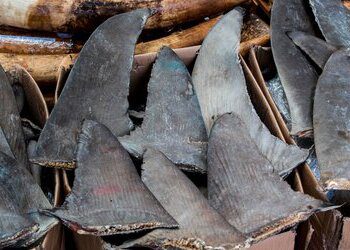Authorities in Ecuador are considering how to respond to an international penalty on its shark trade, which may be the first step in a difficult struggle to stop the trafficking of shark fins in the country.
Ecuador’s Ministry of Production, Foreign Trade, Investments and Fisheries (Ministerio de Producción de Ecuador – MPCEIP) has had discussions in recent days with fishing authorities and other governmental bodies to create a plan response in response to a notice issued in March by the Convention on International Trade in Endangered Species of Wild Fauna and Flora (CITES), an international agreement that regulates the wildlife trade.
In its notice, CITES recommends that signatory countries “suspend commercial transactions of shark and stingray species included in Appendix II of CITES before COP19 from Ecuador or whose country of origin is Ecuador.”
The penalty came after a November request by CITES that Ecuador implement measures to create a more sustainable shark trade, which included determining the exact fishing capacity of certain species and establishing catch and trade quotas. CITES also asked Ecuador to set limits on the incidental capture of sharks, which occurs when sharks are accidentally caught during fishing activities for other species. Ecuadorian law permits sales of sharks caught this way.
Shark Fin Trade Thriving in Latin America, Despite Promises of Progress
The country had 120 days to implement the provisions requested in November. However, CITES never received information related to incidental fishing from Ecuador, and the documentation sent by the country during that time period was deemed insufficient.
As a result, CITES proceeded with the penalty, which will only be lifted once the country meets the international body’s demands.
InSight Crime Analysis
The CITES penalty is a test of whether international penalties can compel Ecuador to take actual steps to slow down the uncontrolled trade of shark fins. So far, it’s not looking good.
Although targeted shark fishing is illegal in Ecuador, hundreds of thousands of species are caught each year and reported as “incidental” catches.
“Everything is declared as incidental fishing,” biologist Alicia Kuroiwa told InSight Crime.
The fins and parts of “incidentally” caught sharks are “laundered” into the legal supply chain and sold on the international market.
“Ecuadorian regulations also do not have a limit for incidental fishing,” Kuroiwa added.
As there is no limit on the sale of the incidental catch, Ecuador has become one of the world’s main exporters of shark fins in recent years.
The country recorded 321 metric tons of exports in 2021, almost quadruple the 90 tons exported the previous year. Profits from shark fins also multiplied, from $647,000 in 2013 to $9.7 million in 2021, as reported by InSight Crime in a 2022 investigation.
A significant portion of Ecuador’s shark fins and other parts are exported to Peru. From there, they are sent on to Asia.
And for CITES, that is where the problems began. According to figures reported by Ecuador to CITES, it exported 210 tons of shark fins to Peru in 2021. However, Peru reported it had imported 244 tons from Ecuador.
Loopholes Fuel Shark Fin Trade in Ecuador
The difference raised questions and led to an investigation that caused the sanctions. Investigators discovered that some shark fins were entering Peru through uncontrolled routes as illegal goods, and others were hidden among fins of other fish types whose trade is allowed, or are labeled as frozen fish when leaving the country.
Another concerning aspect of the trade was the quantity: 300 tons of fins from accidental fishing was a large number of sharks.
Experts on shark trading consulted by InSight Crime have described the sanction as a initial move to pressure Ecuador into establishing greater controls over the trade of shark fins and other species.
“Certainly, now Ecuador has no choice but to fix the problems and errors made, both in terms of management, control, and oversight, as well as legislation around sharks,” said Cristina Cely, director of the environmental organization One Health Ecuador.
Along with new regulations, security forces, fishing authorities, and customs need to put in place stronger controls at the borders and reinforce measures to stop the illegal crossings to prevent the trafficking of CITES’ cited species, explained Cely.
“I hope that Ecuador continues to be under the scrutiny of CITES and other organizations because clearly, we are not doing things right with our protected species and those that are endangered,” Cely added.
Featured image: Shark fins displayed at a pier before being sold. Credit: AFP

